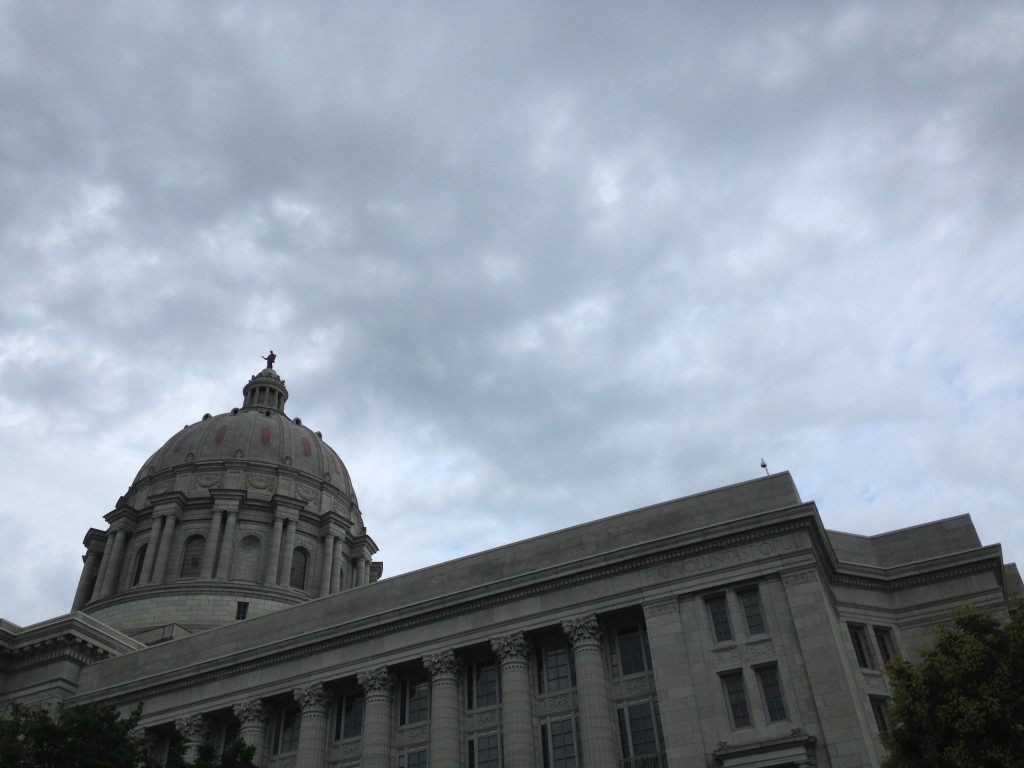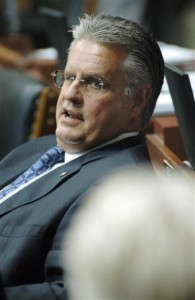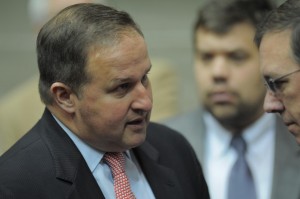 – On Friday, November 15, Democratic Gov. Jay Nixon was in the woods in rural northern Missouri for deer camp. He and other hunters had gathered in Clark County that evening ahead of the opening of deer hunting season the following morning.
– On Friday, November 15, Democratic Gov. Jay Nixon was in the woods in rural northern Missouri for deer camp. He and other hunters had gathered in Clark County that evening ahead of the opening of deer hunting season the following morning.

2013
But late in the evening a phone rang, and Nixon took an urgent call from his office: Executives from The Boeing Company tasked with finding a place to locate production of their new 777x commercial airliner wanted to meet. There, Nixon crashed his schedule for the following week and the fight for Boeing was on.
Just seven days later, Nixon announced his first public meeting in St. Louis with executives from Boeing. The topic of the meeting was potentially huge for the St. Louis region: Nixon revealed that Missouri was one of nearly a dozen states the company was considering to locate the 777x’s production. Pointing to almost $100 billion in pre-sales, Nixon pledged to go to the mat for as many as 8,000 jobs that could be tied to the project.
Nineteen days after that first publicly acknowledged meeting, Nixon was back in St. Louis – signing an up to $1.7 billion incentive package and sending in the state’s response to Boeing’s request for proposal. In the days of partisan gridlock in Washington and Jefferson City (just a few weeks earlier, Nixon and Republican lawmakers were feuding over which building in a two block radius to hold a meeting on Medicaid), calling a 26 day turnaround fast might be an understatement. In Jefferson City, that’s faster than light speed. As Mel Brooks, director and writer of Spaceballs, might have said, moving an incentive package that fast through the General Assembly was nothing short of “ludicrous speed.”
Just eight days into talks with Boeing executives, Nixon announced on the day after Thanksgiving he would call lawmakers into special session to consider an incentive package, which would allow up to $150 million annually for expanded tax credits targeted at aerospace development. Prior to the announcement, Nixon was involved in talks with just a handful of state lawmakers, including Majority Floor Leader John Diehl, R-St. Louis, House Economic Development Chairwoman Ann Zerr, R-St. Charles, and Senate Majority Floor Leader Ron Richard, R-Joplin.

Sen. Ron Richard
Early on it was clear that the bill’s biggest hurdle would be the state Senate, where a small but vocal group of lawmakers opposed to expanding tax credits could run down the clock with session on such a short timeline (lawmakers were called in to session just eight days before a response to Boeing’s request for proposal was due).
Richard, a former House Speaker and one of a handful of Republicans with a real working relationship with Nixon, was brought into the conversation early. Nixon met privately with a handful Republican senators early in the week where he pledged to revisit the issue of tax credit reform in the 2014 legislative session. On Friday, hours after the bill passed in the House, Nixon made his first move on the tax credit front, holding off on issuing new low-income tax credits, much to the chagrin of many Democratic members of the legislature.
When the bill came up in the Senate, it passed with little opposition. Eight Senators, including Sen. Kurt Schaefer, a Columbia Republican who announced his intention to run for attorney general in 2016, ultimately voted against the bill being carried by Sen. Eric Schmitt, another Republican considering a run for the seat. Sen. Brad Lager, R-Savannah, a vocal critic of tax credits in the past, passed a minor amendment to the bill that clarified the tax increment financing language but voted against the overall bill.
The process started behind the scenes about a week before Nixon announced his meeting with executives. George M. Roman, the St. Louis-based vice president for State and Local Government Operations at Boeing, got wind that the 777x production line might be up for grabs. Roman, who serves on the board for St. Louis Civic Progress (which represents 30 of the area’s largest businesses and employers) and the St. Louis Regional Business Council, scrambled both organizations to prepare information for Nixon. A team was then assembled between Nixon’s Department of Economic Development and the newly formed St. Louis Economic Partnership, which had daily meetings about Boeing’s request. Tax incentives were a part of their request, but so too were workforce readiness and job training opportunities.
 Throughout the legislative process, Civic Progress and St. Louis Mayor Francis Slay’s office were intimately involved in lobbying to get the bill through. Rodney Boyd and Brian Grace, both lobbyists for Dentons, were seen actively working the halls as the bill progressed on behalf of the two entities. Civic Progress, with its political and lobbying muscle in Jefferson City, took a leading role in backing the bill’s passage.
Throughout the legislative process, Civic Progress and St. Louis Mayor Francis Slay’s office were intimately involved in lobbying to get the bill through. Rodney Boyd and Brian Grace, both lobbyists for Dentons, were seen actively working the halls as the bill progressed on behalf of the two entities. Civic Progress, with its political and lobbying muscle in Jefferson City, took a leading role in backing the bill’s passage.
For much of the week, the state House was largely irrelevant. On Wednesday, Diehl – the body’s Speaker-elect – sent a memo to lawmakers telling them they could go home, as a winter storm was preparing to hit much of southern Missouri. The memo told lawmakers the soonest they would likely be able to vote would be Saturday or the following Monday.
But that was before the bill easily moved through the Senate, and the House Rules and Economic Development committees passed the bill unanimously on Thursday – meaning members of the House could return to Jefferson City to pass the bill on Friday. Diehl’s office sent out a memo urging lawmakers to return to town on Thursday evening to beat the snow expected overnight.
By the time the bill reached the floor of the House at 9 a.m on Friday, its passage was all but certain. That was until a hiccup was discovered: The Secretary of the Senate had sent the House of Representatives the wrong copy of the bill. The office of Senate Secretary Terry Spieler, who has served in the Senate for more than three decades, physically sent the House a copy of the original language to SB 1 without the amendments approved on Tuesday.

House Majority Floor Leader John Diehl (Photo: Missouri House of Representatives)
The House committee on Thursday had voted on the correct language and it was entered correctly in the Senate journal, but the House discovered upon debate on Friday morning that they had received the wrong copy of SB 1. As it had begun snowing outside, the real flurry of motion was inside the state Capitol in the office of the assistant chief clerk of the House, where Dempsey, Diehl, Spieler, and top economic development aides to Nixon were huddled behind closed doors to find a solution.
Diehl appeared on the floor at one point during debate motioning to Rep. Ann Zerr, chairwoman of the House Economic Development Committee, to continue debate while he and other leaders worked to find a fix. After about an hour of confusion, Diehl emerged on the House floor where he presented his solution: Spieler had sent them a message from the Senate correcting the error, and the House would approve a resolution acknowledging her message.
Diehl later said clerical flubs such as that one happen routinely during session, but with much less at stake. In regular session, one single bill almost never receives the scrutiny one might receive during special session and is never under such an inflexible timeline.
With Nixon’s signature on the response to Boeing’s request for proposal, Missouri joins 15 other states in waiting to hear back from the aviation giant. Boeing has said they will announce the location for production of the 777X sometime in January.
